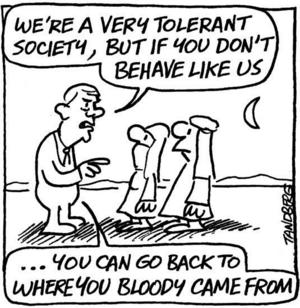
At this point in time, he hasn’t succeeded in winning an official exemption for his kids – and he’s up against a formidable barrier. The Province of Ontario’s Education Act decrees that music is a compulsory subject for all primary-school students.
The issue reminds me of a girl who was in my class in public school, many years ago. I believe her name was Barbara: she was a quiet, bright student, and generally well liked. But every morning, just before students sang O Canada, she would slip out of the classroom, returning a few minutes later.
One day, I asked her why she did this. She explained she was a Jehovah’s Witness, and her religion did not believe in “worshiping worldly nations” (or words to that effect). This struck me as a strange position to take – but at this point in my education I had already learned that there are some pretty strange religions in the world. I also knew that religious issues could be contentious, and best left alone. I gave her no argument.
Her exemption from O Canada went on for years, without any apparent harm done to Barbara, the other kids in the class, or the nation as a whole. It was an utterly victimless crime.
That’s why I believe that exempting Dasu’s children from music lessons would be a similarly victimless crime. What harm would be done to these kids if they missed out on music? Would their teeth grow crooked? Would they develop dandruff or flat feet?
Many of those opposed to an exemption seem to view the question as a “floodgates” issue. “If we allow this, then what other demands will follow?”, they ask. My response is that each request for special consideration should be weighed on its own feasibility. I can imagine that some requests for religious exemptions might be unwieldy, expensive or even impossible to grant in the Public Schools – but Dasu’s request isn’t one of them. Excusing his kids from music classes would cost nothing, and would pose no serious logistic problems. (Dasu has suggested his kids could go to the library during music class, or perform volunteer activities in the school.)
Other critics of Dasu’s intentions have boldly argued that he misunderstands his own religion: that music is not forbidden (haram) in the Islamic faith. Indeed, a little Googling soon reveals that music is a contentious issue among Muslims, and some see nothing wrong with it. (As any ethnomusicologist can confirm, Islamic nations are rich in musical traditions.) But it doesn’t matter if many or even most other Muslims disagree with Dasu: religion is not a “majority rules” kind of thing, and he can’t simply be voted down. He has a right to his own religious beliefs, and that’s something that should be taken seriously in a society that upholds freedom of religion.
As well, in many of the responses to this issue, there lurks the underlying assumption that Dasu’s wishes fly in the face of the whole idea of public education. And I get the impression that lots of people think that Ontario’s Public Schools are culturally neutral spaces for everyone, favouring no particular belief-system. To preserve this pristine and egalitarian learning environment, religious concerns must be firmly barred at the door.
In Ontario, we have two government-funded school boards. In the so-called Separate Schools, Roman Catholicism forms the basis of the schools’ values. In the Public Schools, the underlying belief-system is Secular Humanism. Is Secular Humanism a religion? Maybe or maybe not, depending on your definition of the word – but if it’s not a religion, it will do just fine until one comes along. Secular Humanism is a complex belief-system, with its own tenets, texts, traditions, and more than a few missionaries. There is nothing “neutral” or “universal” about it.
So where are Ontarians to send their kids, if they adhere neither to Roman Catholicism nor to Secular Humanism? What if their beliefs are based on Judaism or Buddhism or Hinduism – or Islam? Private schools are expensive, and home-schooling, although allowed, is a difficult proposition for many families.
The ultimate solution to the problem, I believe, is to establish some kind of charter system for the schools – providing funding to schools of all belief-systems (including Secular Humanism), where student-numbers warrant and as long as educational standards are upheld. And to those who would argue that this is a dangerously divisive idea, I would point out that Ontario’s Roman Catholic Schools have been around for a long time, and they don’t seem to graduate people who can’t cope with living in a multicultural society.
In the meantime, let’s accommodate the Dasu family, and any other Muslims who believe that music is forbidden to them.
And by the way, if anyone is wondering, I’m still quite fond of music.
© Colin Eatock 2016
 RSS Feed
RSS Feed

